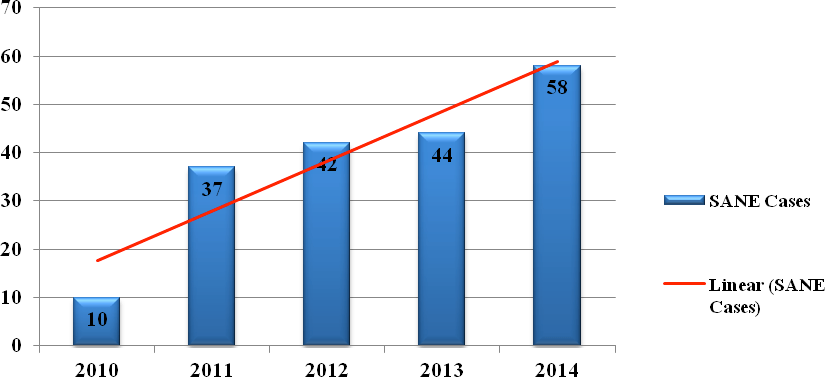Community Partnerships Foster the Inception of a SANE/SART Program in Western Kansas
Carol Groen and Jessica Albers
Hays Medical Center, Hays, Kansas
Author Note
Carol Groen, Manager of Clinical Certifications, SANE and Special Projects, Hays Medical Center; Jessica Albers, SANE Team Leader, Hays Medical Center. Correspondence regarding this article should be addressed to Jessica Albers, RN, BSN, MFS, SANE-A, Hays Medical Center, 2220 Canterbury Drive, Hays, KS 67601. Phone: (785) 261-7123. E-mail: jessica.albers@haysmed.com
Abstract
This article highlights a Sexual Assault Nurse Examiner/Sexual Assault Response Team (SANE/SART) program developed by a community in rural Kansas focused on offering comprehensive services to sexual assault victims. Community and hospital buy-in initiated the development of this multidisciplinary response featuring specialized medical-forensic care provided by nurses. Key stakeholders, including representatives from a community hospital and regional referral center, and a forward-thinking university with 13,000 on-campus, virtual, and international students, have collaborated to impact the services offered to victims of sexual assault in western Kansas.
Keywords: victim-centered nursing, medical-forensic care, sexual assault, advocacy
Why SANE/SART?
It is widely accepted that victims of sexual assault or abuse can benefit from specialty services provided by Sexual Assault Nurse Examiners (SANEs). Through the evolution of forensic nursing, numerous researchers have evaluated the effectiveness of SANE programs (Campbell, Patterson, & Lichty, 2005), and victim surveys have shown that victims treated by a SANE report less assault- related anxiety, feel more secure alone, and feel they were informed, believed, and in control during the exam (Ericksen et al., 2002). In addition, studies have shown that forensic evidence collected by SANEs contain (a) more swabs that match the documentation of penetration, (b) more accurately labeled swabs, and (c) more blood/urine samples in cases where drug-facilitated assault is suspected (Ledray & Simmerlink, 1997; Sievers, Murphy, & Miller, 2003).
SANEs are registered nurses who have completed specialized education and clinical hands-on training in the medical-forensic care of patients who are the victims of sexual assault or abuse. SANEs provide streamlined care during a comprehensive medical-forensic examination. As part of a SANE exam, the nurse is able to spend one-on-one time with the patient, allowing the two to establish a rapport before medical-forensic examination actually begins. This exam includes a detailed medical-forensic history of the assault, thorough head-to-toe physical assessment, written and photographic documentation of bodily findings, collection and management of forensic samples, and the provision of educational and emotional support, safety planning, and follow-up resources. The SANE ensures that the proper chain of custody of the forensic samples is maintained so that the evidence will be admissible in court and that he or she can testify in any legal proceedings related to the examination, if necessary. The combination of victim-centered nursing care with knowledge of the legal system has throttled forensic nursing forward, making it the fastest growing subspecialty in the field.
The Sexual Assault Nurse Examiner/Sexual Assault Response Team (SANE/SART) is a community-based team that coordinates the response to victims of sexual assault. The SART may comprise law enforcement personnel, attorneys, domestic and sexual assault victim advocates, crime lab personnel, child protection specialists, SANEs, and hospital personnel. These professionals strive to assure that the response to a victim of sexual assault in their community is victim-centered and compassionate, resulting in appropriate criminal justice.
This article is an account of how one rural Kansas community was able to successfully launch and sustain SANE/SART services in a previously underserved region.
Before SANE/SART
Prior to 2010, sexual assault victims who sought medical-forensic care in Ellis County, Kansas, and other surrounding counties had two options. They were either seen at the Hays Medical Center (HaysMed) emergency department by a nurse and physician who collected a “rape kit” and turned it over to law enforcement, or the patient was driven 100 miles away to the closest central Kansas SANE program for specialized care. Both options presented challenges for responding agencies, and neither was viewed as optimal for victims of sexual assault.
When victims would seek care at the HaysMed emergency department, they would first have to tell the clerical staff why they were there, provide demographics at the window, and then be asked to wait in the waiting room for a triage nurse. Once triaged, depending on room availability, the victim was then either taken to a room or asked to wait until one was available. Advocates were not routinely called to provide support, often leaving the victim alone and scared. The victim was then informed about the availability of a specialized SANE located 100 miles away and given the choice to travel for the exam or to have the rape kit collected in the hospital by the emergency department nurse and physician. If the victim chose to stay at the hospital, she or he would then tell her or his account of the assault to the primary nurse and physician before the rape kit was collected and turned over to law enforcement. Following this experience, few community resources or options were available to these victims of sexual abuse.
As the second option, the victim could travel 100 miles for the SANE exam, which created several obstacles not only for the victim but also for the advocate or law enforcement official who was transporting them. The travel time to and from the facility, and the length of time it took to completely examine and treat the victims, were extensive. With limited personnel available, law enforcement and advocate agencies viewed the time spent transporting victims to SANE exams as time away from the community—and therefore as an obstacle. For the victims, the distance and time away from their homes, family, and friends was also seen as a barrier to reporting sexual assault and following through with the SANE examination.
Community Action
Six years ago, through the perseverance and determination of various community members, including students and faculty affiliated with the Fort Hays State University (FHSU) leadership studies program, HaysMed was asked to develop and implement a SANE/SART program within the community. In early 2010, FHSU leadership studies students and faculty organized a series of community meetings to discuss improving services for victims of sexual assault. Community stakeholders were invited to attend, including law enforcement, county attorneys, domestic and sexual violence advocates, victims of sexual assault, and HaysMed administrators. During the initial meeting, presenters shared information about the current available resources and response procedures, and highlighted the paramount value that the community placed on having access to advanced, specialized services. In this open forum, powerful voices were heard and victim experiences were shared. Victims described the difficulties they encountered traveling away from the community for a SANE exam, feeling alone and without support during their travel, and experiencing nausea and vomiting after receiving medications to prevent sexually transmitted infections and pregnancy. Attorneys discussed the positive impacts that the established specialized SANE programs were having on legal proceedings, and reassured the audience that if a program were created in Ellis County the goal would be for it to be high-quality and sustainable.
Development of a SART
As a community hospital and regional referral center, it was time for HaysMed to develop a SANE program to serve not only its locality but all of the communities in northwestern Kansas. Hospital administrators and community leaders recognized that bringing this level of expertise to the community and catchment area was essential. The team understood that establishing a SANE program in the rural community would mean a better experience for victims, their families, and people who care about them; it would also allow for more clearly verifiable forensic evidence. Indeed, the request from the community to develop a SANE program was taken seriously by the hospital administrators, who decided very quickly to move forward with program development by bringing together key community players to formulate a coordinated response to sexual abuse.
In the initial meetings, participants identified collaboration from a variety of stakeholders as an important first step toward the formation of a SART. As a result, two separate committees were formed. The SANE/SART Advisory Board Committee consisted of local law enforcement officials from surrounding communities, FHSU leadership, HaysMed administrators, SANE team leaders, prosecuting attorneys, domestic and sexual violence advocates, and representatives of the state Department of Children and Families (DCF). This multidisciplinary advisory board met biweekly, then monthly, to provide direction and oversight of the program and create memoranda of understanding for all SART members. Delineation of roles and responsibilities of responders for interagency coordination and collaboration, as well as and the creation of uniform standards, were important factors for the Advisory Board to undertake. It was understood that the standardization of procedures would improve overall victim care and enhance investigation and prosecution of sexual assault cases.
The Community SART Committee consisted of community members, FHSU leadership studies students and faculty, law enforcement representatives, a member of the SART Advisory Board, and advocates, and was charged with providing education within the community, victim support, fundraising, and community awareness of the SANE/SART program. Advertising the specialty services was essential to connecting with victims who otherwise might not reach out to law enforcement or advocacy agencies, and to ensuring that victims knew it was an option to seek medical care first. The Community SART Committee provided clothing, post-exam hygiene kits, and other supplies needed by victims. By having a coordinated community-wide response to sexual violence, the SANE/SART program would help victims gain access to comprehensive medical care, minimize trauma, and seek valuable community resources.
Development of a SANE
In March 2010, the HaysMed administration enlisted the assistance of an established team of board-certified SANEs in central Kansas. Under contract, they provided assistance during the planning stages and throughout the first year and a half of the program. Key questions were raised during the start up of the program, and through discussion and knowledge sharing of methods that have worked in other SANE/SART programs, new policies and procedures were designed to meet the needs of the program and community.
The dedication of all agencies involved was vital to bringing together many of the available community resources to begin the work of developing an effective SANE/SART program. Collaboration between the agencies occurred during a 40-hour SANE/SART course provided at HaysMed in April 2010. In attendance were nurses, law enforcement personnel, prosecuting attorneys, advocates, DCF staff, hospital administrators, and other engaged community members, allowing brainstorming of key questions and knowledge sharing to occur naturally and across stakeholder groups. Nurses toured with local SART partners and the closest Kansas Bureau of Investigations Laboratory to gain insight into how all of the agencies work together and how they impact one another, and to better understand how a victim navigates through all of these services.
Examining the occurrence of sexual assault in northwestern Kansas was a critical step. Law enforcement partners revealed that, according to recent statistics, reported sexual assault numbers were consistently low in northwestern Kansas and that there had not been a reported campus sexual assault in the region for several years. These findings were discussed, notably in the context of the widely accepted knowledge that approximately one-half of all victims of assault do not report to law enforcement. It was important to the sustainability and quality of the program that enough SANE exams be performed to allow the nurses to remain competent and maintain their skills. The shared outlook was that if specialty services were offered, victims would be more willing to seek medical care and possibly be more willing to report sexual assault to law enforcement agencies.
Ensuring a quick, efficient means for outlying counties to refer victims to HaysMed for a SANE exam was a critical access point. HaysMed utilized the existing ED Direct program, a direct physician referral line that enabled referring agencies to connect quickly with the on-call SANE. Rolodex cards and program information were mailed to law enforcement agencies and medical providers in northwestern Kansas. Referrals from outlying communities were received immediately, and this access point continues to be the primary source of referrals.
Estimated set-up costs for recruitment, education, training, and equipment were substantial; however, the HaysMed Foundation provided funds to purchase a secure digital camera system and an electronic exam table. A peaceful, private, and secure area was located within the hospital and set up to support an exam room, restroom with shower, office area, and kitchenette. Seven nurses were recruited and received training, hands-on clinical experience, and case review. To gain more clinical experience, nurses were also sent to larger facilities with well- developed SANE programs to be on call with other SANE nurses. During their training, nurses observed two SANE exams, assisted with four exams, and performed two exams monitored by an experienced SANE before becoming independent examiners. Education and training represented the most expensive start-up costs and continue to be a high priority. From the outset, however, HaysMed understood that the community benefits of this program would far outweigh the costs.
Implementation of SANE/SART
In July 2010, HaysMed launched its first Sexual Assault Nurse Examiner program dedicated to providing compassionate and comprehensive care for sexual assault victims. Victims can be treated by on-call SANE nurses who understand the importance of providing care in a safe, respectful, professional environment while collecting medical-forensic evidence. The protocols include notifying the advocacy agency that responded to the hospital to offer their services, support, and knowledge of resources to victims. In Kansas, the county in which a crime occurs pays for the cost of the medical-forensic exam. Concurrent medical care provided during the SANE exam—such as a medical screening exam by the emergency department physician, a pregnancy test, and medications to prevent sexually transmitted infections and pregnancy—is written off by the hospital. Eliminating costs normally allocated to the patient is an additional community benefit that HaysMed determined was essential to providing comprehensive care in a manner that would not deter patients from seeking treatment. In its first six months, the program saw 10 patients; in 2014, 58 patients received sexual assault exams (see Figure 1).
 Figure 1. Increase in sexual assault exams at HaysMed from 2010-2014.
Figure 1. Increase in sexual assault exams at HaysMed from 2010-2014.
Fostering Continued Growth
The SANE/SART program has nurtured strong relationships with community partners and continues to search for ways to share its message. In 2013, the SANE program joined a previously formed group of community leaders who had developed an educational Domestic and Sexual Violence Summit whose focus was to provide quality education on topics related to gender-based violence. Until the formation of the summit, professionals from western Kansas were obligated to drive long distances to metropolitan areas to be able to attend conferences. In 2013, the SANE program joined forces with the summit committee, adding a second day focusing on forensic science, with the objective of offering information on topics of interpersonal violence and sexual assault to a multidisciplinary audience whose members provide medical care, investigative services, and community resources. The feedback from participants has been positive and continues to foster the growth of the two-day conference.
Also in 2013, the Fort Hays State University Center for Civic Leadership, Women’s Leadership Project, and the Title IX Coordinator from the Office of Student Affairs developed a proposal and implemented FHSU’s new Campus Safe Initiative. The purpose of this university-wide task force of key campus and community stakeholders is to study, evaluate, and make recommendations for improvements to the prevention and response to gender-based violence on campus. HaysMed has been actively involved in this task force from the beginning, along with faculty, residential life, student government, Greek life, local domestic and sexual violence advocates, the student health center, the student counseling center and other entities. The task force has enlisted the creativity of students to generate greater awareness of gender-based violence and the promotion of bystander intervention. The Campus Safe Initiative Task Force is developing a student and faculty climate survey to gain baseline insight into the occurrence of and attitudes toward violence on campus. These data will enable the task force to gear future activities to this specific university community. The task force is also researching ways to reach virtual and international students— populations that have proven difficult to reach due to the remote nature of these types of education.
Reaching Out
Spreading awareness is a key component to a successful SANE/SART program. Fostering awareness among partners who provide referrals to SANE programs is one objective that HaysMed strives to reach. SANE nurses travel across the 26-county rural referral area to share information regarding services to law enforcement personnel, county attorneys, hospital staff, and EMS providers. The program also sends brochures, service information, and rolodex cards with important contact information to the agencies in these counties on an annual basis. Co-presentations to FHSU criminal justice studies and women and crime courses have enabled SART members to share insights with students who may one day work with victims and perpetrators of crime.
Community outreach is also essential. Historically, only about one-half of victims of sexual assault report to law enforcement, so sharing information with individuals is paramount. Outreach within Ellis County is accomplished through partnerships and collaboration in order to achieve a streamlined approach and efficient use of collective resources. Community presentations are offered at the local high school, FHSU and technical colleges, churches, women’s groups, and at wellness fairs. One particular set of awareness presentations is given during the FHSU wellness classes in both the spring and fall semesters, reaching over 1,000 students in the most recent year. Agencies have also partnered to share information with all incoming FHSU freshmen, spending 50 minutes on the topics of gender-based violence and bystander intervention at new student orientations.
Due to the difficulty of sustaining SANE programs, there is a need in western Kansas for additional nurses with this specialty education. The availability of SANE services is limited across the western half of the state; consequently, referrals to HaysMed from southwestern Kansas are on the rise. It is not uncommon for victims of sexual assault from the far corners of the state to drive 200 miles one-way for a SANE exam. In light of this significant inconvenience for victims, HaysMed has been enlisted to help other rural communities sustain their existing SANE programs and to help hospitals that want to start one. Across most of the United States, there is a need for SANE programs in rural areas. Kansas is no exception. Coming full circle, HaysMed has provided clinical, hands-on, focused education around the care of sexual assault patients to a group of rural nurses who have completed the 40-hour SANE course. The hands-on training is of particular importance because, due to the low volume of patients in rural areas, it can be difficult for nurses to gain the hands-on experience needed to become a SANE.
Lessons Learned
In order to support a successful SANE/SART program, it is essential to build a broad- based coalition from across the community. This is achieved by utilizing a multidisciplinary team of professionals and community members who are striving for a common goal. Setting goals and encouraging growth among the members will promote an atmosphere in which forward movement will flourish.
Standardized policies and procedures, memoranda of understanding, and streamlined referral procedures are key to ensuring a consistent response to sexual assault. Frequent case review as it applies to current situations can enable programs to enhance and mold their responses to the ever-changing climate of the community’s needs. Flexibility among SANE/SART members to be able to adapt to emerging challenges and changing community needs is also essential. The ability of the team to draw upon their existing strengths can allow communities to address these issues directly and efficiently.
Looking Forward
Opportunities exist for the continued development of the SANE/SART program. Garnering program and case-review feedback from outlying counties could offer additional insight into aspects of providing services to a large rural catchment area. Providing education and program assistance to rural areas in western Kansas hoping to sustain an existing program or create a new SANE/SART program will enable victims to access services closer to home. Finally, expansion of forensic services at HaysMed to include exams for victims of strangulation, domestic violence, and child abuse are currently underway, signaling a natural progression of the specialty services offered by SANE nurses.
Partners invested in assisting victims of crime can make an impact on the availability of services in their communities. Plans for long-term sustainability and growth are essential to maintaining quality programs. Strong resources exist for communities interested in sustaining or starting a SANE program and can be accessed through the International Association of Forensic Nurses (IAFN) and associated partners, state IAFN chapters, state and local coalitions against violence, and existing SANE/SART programs. Partnerships that challenge existing frameworks and encourage growth and expansion will see opportunities to make a SANE/SART program a viable option in their communities.
References
Campbell, R., Patterson, D., & Lichty, L. (2005). The effectiveness of Sexual Assault Nurse Examiner (SANE) programs: A review of psychological, medical, legal and community outcomes. Trauma, Violence & Abuse, 3, 313-329.
Ericksen, J., Dudley, C., McIntosh, G., Ritch, L., Shumay, S. & Simpson, M. (2002). Clients’ experiences with a specialized sexual assault service. Journal of Emergency Nursing, 28, 86-90.
Ledray, L., & Simmelink, K. (1997). Efficacy of SANE evidence collection: A Minnesota study. Journal of Emergency Nursing, 23, 75-77.
Sievers, V., Murphy, S., & Miller, J. (2003). Sexual assault evidence collection more accurate when completed by sexual assault nurse examiners: Colorado’s experience. Journal of Emergency Nursing, 29, 511-514.
Author Biographies

Carol Groen, RN, MSN, CEN, NE-BC has worked over 40 years at HaysMed where she provided treatment to victims of sexual abuse and domestic violence and was instrumental in the development of the SANE/SART Program. Carol continues to serve on the Ellis County SANE/SART Advisory Board and various other committees and task forces in her job as a Manager of Clinical Credentials, SANE & Special Projects. Carol is a member of the ENA, IAFN, KONL and AONE. She has been a nursing instructor at Fort Hays State University, Barton County Community College and North Central Kansas Technical College.

Jessica Albers, RN, BSN, MFS, SANE-A is a board certified Sexual Assault Nurse Examiner- Adult/Adolescent. She has been employed at HaysMed for a total of 12 years and has firsthand experience with the evolution of sexual assault patient care at HaysMed, and is the current SANE Team Leader. She received a Bachelor of Science in Nursing at the University of Nebraska Medical Center- Lincoln in 2000 and earned a Master of Forensic Science from Nebraska Wesleyan University in 2004. Jessica serves on the Ellis County SANE/SART Advisory Board and is the current president elect of the Kansas Chapter of International Association of Forensic Nurses.

